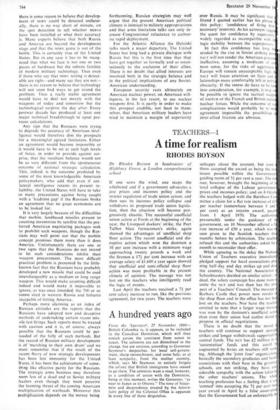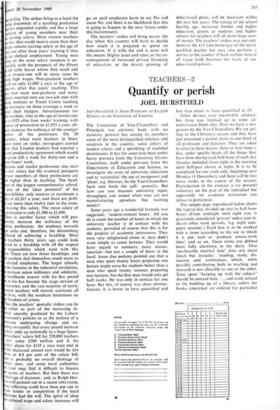TEACHERS-1
A time for realism
RHODES BOYSON
Dr Rhodes Boyson is headmaster of Highbury Grove, a London comprehensive school
If one sows the wind, one reaps the whirlwind and if a government advocates a just prices and incomes policy and the stricter regulation of trade union action, and then sees its incomes policy collapse and withdraws its proposed trade union legisla- tion, then the situation will become pro- gressively chaotic. The successful unofficial union action at Fords at the beginning of the year, the Liverpool dockers' strike, the Port Talbot blast furnacemen's strike, again showed the advantages of unofficial shop floor action. The recent unofficial and dis- ruptive action which won the dustmen a 16 per cent increase with a minimum wage approaching twenty pounds a week and the firemen a 17+ per cent increase with an average salary of £1,600 a year again showed that unofficial and semi-official shop floor action was most profitable in the present climate of opinion. The message was not lost on the teachers who intelligently read the logic of events.
Last April the teachers received a 71 per cent salary increase to run, like the previous agreement, for two years. The teachers were
unhappy about the amount, but most them accepted the award as being the ma imum possible within the Governmen guiding norm of 34 per cent a year. The su mer, however, brought the beginning of t total collapse of the Labour governmen prices and incomes policy; and on 8 Octo the teachers lodged with the Burnham Co mittee a claim for a flat rate increase of fl per teacher (somewhere between 8 and per cent) as an interim award, payab from 1 April 1970. The authorit presumably under the guidance of government, on 10 November offered a rate increase of £50 a year, which was sum given to the Scottish teachers thr• months before by arbitration. The teache refused this and the authorities asked for month to reconsider their offer.
While agreeing to the delay the Nation Union of Teachers executive immediate' pledged support for local associations pla ning half-day and day strikes up and dos the country. The National Association Schoolmasters decided on similar action: i deed, the salary campaign has done more I unite the NUT and NAS than has the pr pect of a Teachers' Council. The message Barbara Castle that power now resides the shop floor and in the office has not lost on the teachers. Nor have the teache omitted to note that a larger wage increa was won by the dustmen's unofficial acho than even their union had earlier dared t propose in official negotiations.
There is no doubt that the mood teachers will continue to support sporad strikes and longer withdrawals supported b central funds. The NUT has £2 million in it `sustentation' funds and this could augmented by levies on teachers still work ing. Although the 'joint four' organisation basically the secondary graduates and heads associations with their base in the gramma schools, are not striking, they have co siderable sympathy with the action taken b the other teachers' unions. The who teaching profession has a feeling that it s% `conned' into accepting the 74 per cent tw year award in April by a false assumph that the Government had an enforceable . policy. The strikes bring to a head the ng discontent of a teaching profession has expanded rapidly and has a large rtion of young members near their starting salary. Most women teachers ya that they could receive more than their per annum starting salary at the age of ty-one after three years' training if they up clerical employment. Young men ng on the same salary compare it un- bly with the prospects of the fifteen old early leaver whom they teach and at twenty-one will in many cases be ;rig high wages. Non-graduate teachers still on only £1,085 a year at the age of ty-six after five years' teaching. This s that most non-graduate and many Late married men are two-job men with ng institute or Youth Centre teaching necessary on three evenings a week to ce their budgets. Advertisements for c wardens, who at the age of twenty-one at £925 after four weeks' training, with pects of promotion to £1,925 a year, ob- y increase the militancy of the younger hers of the profession. On 20 ember, when most teachers in Inner on were on strike, newspapers carried s that London dockers had rejected a and productivity agreement which would given £36 a week for thirty-one and a rter hours' work.
tors and similar professions also start a low salary but the eventual prospects most members of these professions are h higher than in teaching. The head- er of the largest comprehensive school, spite of the 'ulcer potential' of his
nsibilities, only receives at maximum a y of £4,265 a year; and there are prob- e not more than twelve men in the coun- drawing this salary. The mean salary of profession is only £1,500 to £1,600.
ere is another factor which will pro- vely increase the militancy of the ing profession: the tendency towards units and, therefore, the diminishing tihood of achieving a headship. Most teachers thirty years ago could look and to a headship with all the respect responsibility which went with this us. There are now fewer headships, and k teachers feel themselves much more to salaried employees. The larger schools, the factories in the industrial revolution, increase union militancy and solidarity. e handloom weaver with his five pound e in his hat became the wage servant of factories; and the vast majority of newly -tilted teachers will remain assistants all r lives, with the resultant limitations on r freedom of action.
hus the teachers' sporadic strikes can be
either as part of the increasing in- trial anarchy produced by the Labour ernment's policies or as the malaise of a fession undergoing change and ex- ding so rapidly that every pound increase salary adds up nationally to a huge figure.
teachers' salary bill for 320,000 teachers now some £500 million and if the hers' claim for £135 a year were met in
the increased annual cost would be £44 ion or 8.8 per cent of the salary bill. re is probably no overall shortage of chers now, and some local authorities
Year may find it difficult to finance
r quota of teachers. But then there was shortage of dustmen: and, as Ralph Hair- so well pointed out in a recent SPECTATOR, collecting could have been put out to ate tender or competition if the local orities had the will. The spiral of shop induced' wage and salary increases will
go on until employers learn to say No and mean No, and there is no likelihood that this is going to happen in the near future under this Government.
The teachers' strikes will bring nearer the day when this country will have to decide how much it is prepared to spend on education. If it wills the end it must will the means. Higher taxes and rates, or the en- couragement of increased private financing of education, or the drastic pruning of educational plans, will be necessary within the next few years. The raising of the school leaving age, increased further and higher education, grants to students and higher salaries for teachers will all claim large sums of money. The teachers' strikes may not only increase the £13 take-home pay of the newly qualified teacher but may also perform a service to the country if hard realism instead of vague faith becomes the mark of our educational policies.











































 Previous page
Previous page